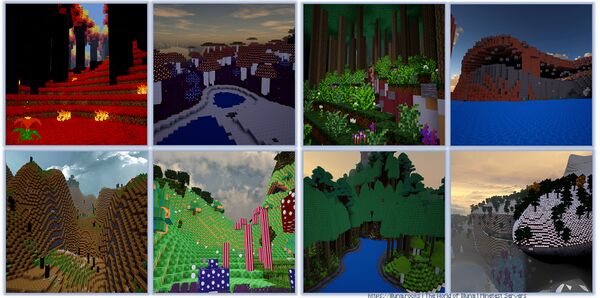Difference between revisions of "Biomes"
m (→Biome Ordering) |
|||
| Line 25: | Line 25: | ||
Each biome is assigned with a heat and humidity value between 0 and 100. For example, the Fiery Biome has heat=100 and humidity=0, whereas the Frost biome has heat=9 and humidity=42. Now, as stated by Rubenwardy in [https://rubenwardy.com/minetest_modding_book/en/advmap/biomesdeco.html#visualising-boundaries-using-voronoi-diagrams Biomes in Minetest Modding Book]: | Each biome is assigned with a heat and humidity value between 0 and 100. For example, the Fiery Biome has heat=100 and humidity=0, whereas the Frost biome has heat=9 and humidity=42. Now, as stated by Rubenwardy in [https://rubenwardy.com/minetest_modding_book/en/advmap/biomesdeco.html#visualising-boundaries-using-voronoi-diagrams Biomes in Minetest Modding Book]: | ||
" | "The simplest way to visualise which biomes may share borders is to create a Voronoi diagram \[...\]" | ||
A Voronoi diagram can reveal where biomes that should border each other do not, and where biomes that should not border each other do. It can also give a general insight into how common biomes will be in-game, with larger and more central biomes being more common than smaller biomes or biomes that are located on the outer edge of the diagram. | A Voronoi diagram can reveal where biomes that should border each other do not, and where biomes that should not border each other do. It can also give a general insight into how common biomes will be in-game, with larger and more central biomes being more common than smaller biomes or biomes that are located on the outer edge of the diagram. | ||
Revision as of 16:11, 30 July 2021
Our TechEth-server features a unique mapgen, with unique biomes, originally based on the ones from the Ethereal mod.
Our biomes try to follow specific logics, for example: in high areas, only biomes associated with colder temperatures should be discoverable.
Biome-list[edit]
Redwood forest[edit]
The original mod has a so called "mesa" biome in this place, mostly featuring clay. We chose to replace this with a beautiful Redwood-forest with customized Redwood-trees and exclusive Douglasie-trees. It also comes with a boat-load of flowers and plants. While the gravel can reach as deep as -192 nodes, the forest can be found at +3 to +92 above sea level.
Frost[edit]
At +90 above sea level, it can get a bit frosty, this is where silver sand may be found. At +130, you may start to discover Crystal dirt and ice. It also contains special and regular Frost trees, Crystal spikes, Crystal grass, but also Snowy grass.
Candy[edit]
Yes... actual candy, oh my god! Candy trees! Nyancat-mobs! What is happening!?
This biome may be anywhere at +10 nodes above sea level.
more...[edit]
Biome Ordering[edit]
Each biome is assigned with a heat and humidity value between 0 and 100. For example, the Fiery Biome has heat=100 and humidity=0, whereas the Frost biome has heat=9 and humidity=42. Now, as stated by Rubenwardy in Biomes in Minetest Modding Book:
"The simplest way to visualise which biomes may share borders is to create a Voronoi diagram \[...\]"
A Voronoi diagram can reveal where biomes that should border each other do not, and where biomes that should not border each other do. It can also give a general insight into how common biomes will be in-game, with larger and more central biomes being more common than smaller biomes or biomes that are located on the outer edge of the diagram.
This is done by marking a point for each biome based on heat and humidity values, where the x-axis is heat and the y-axis is humidity. The diagram is then divided into areas, such that every position in a given area is closer to the point inside that area than it is to any other point on the diagram.
Each area represents a biome. If two areas share a border, the biomes they represent in-game can be located next to each other. The length of the border shared between two areas, compared to the length shared with other areas, will tell you how frequently two biomes are likely to be found next to each other."
